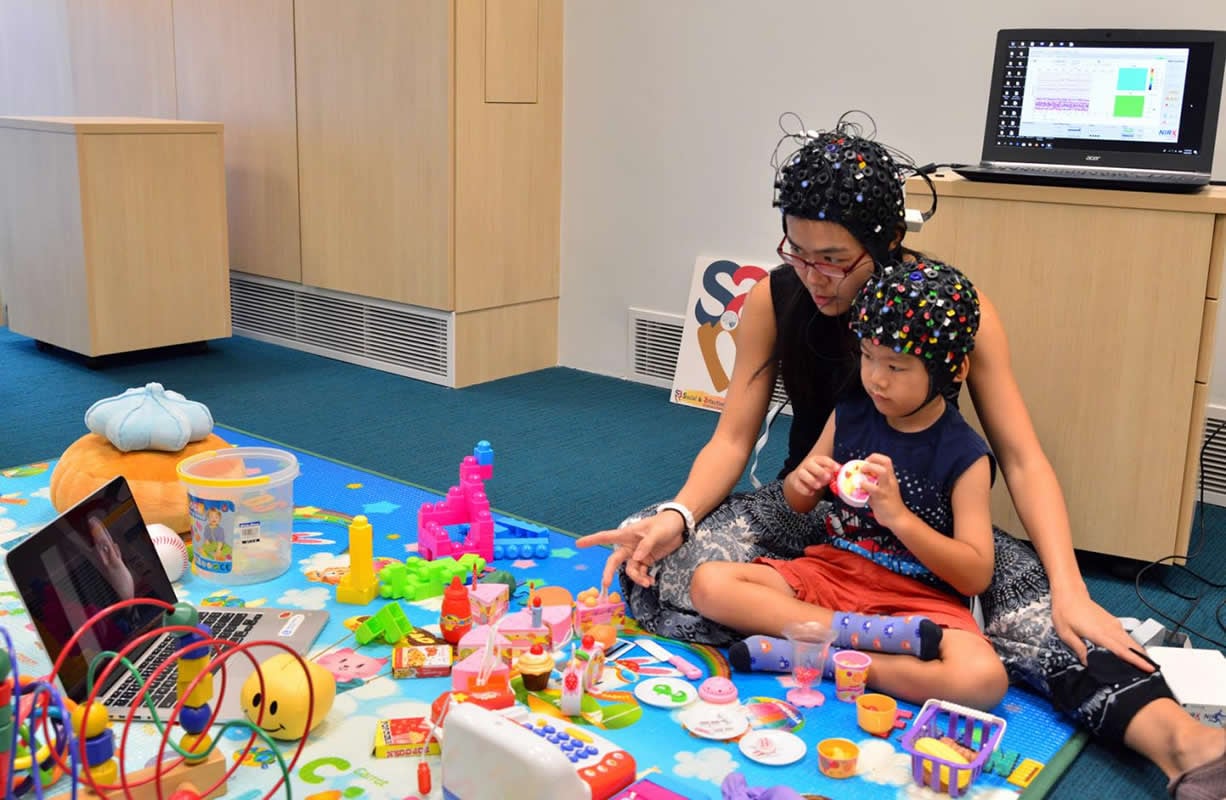Summary: Mothers who reported higher levels of parental stress had less synchrony in brain activity with their young children than moms who were more stress-free. The findings shed new light on how parental stress can impact the mother-child relationship on a day-to-day basis.
Source: Nanyang Technological University
A study led by Nanyang Technological University, Singapore (NTU Singapore) has revealed the effects of the stress of parenting in the brains of both mothers and their children.
The researchers analysed the brain activity of 31 pairs of mother and child from Singapore while they were watching children’s animation clips together.
They found that mothers who reported higher levels of parenting stress had less synchrony in brain activity with their child (all aged around 3 years old) than those who reported lower levels of parenting stress.
The specific brain region monitored for synchrony was the prefrontal cortex, which is associated with the ability to understand others’ point of view.
In general, when the parent and child show highly similar brain activity in the same area(s) of the brain (i.e. greater synchrony), it suggests that both are highly tuned in to each other’s emotional states.
Parenting stress occurs when the demands of parenting exceed the coping resources that a parent perceives they have available. Excessive parenting stress can block maternal sensitivity, lead to reactions that punish the child and negatively affect the parent-child relationship for the long term.
Senior author of the research Assistant Professor Gianluca Esposito, from the School of Social Sciences who leads the Social and Affective Neuroscience Lab (SAN-Lab) at NTU Singapore, said, “Our study shows that parenting stress may very well weaken mother-child communication early in the process of social interaction. Our observations likely stem from the stressed mother’s reduced ability to share her child’s perspective. This inability to appreciate the child’s viewpoint may reduce the quality of parental engagement and undermine the mother-child relationship in the long run.”
The study, done in collaboration with researchers from the United States’ National Institute of Child Health and Human Development and Italy’s University of Trento and University of Padova, was published in Nature Scientific Reports in August 2019.
How the study was done
The researchers used functional Near-infrared Spectroscopy (fNIRS) caps as a non-invasive way to measure brain activation based on blood concentration levels in the brain. They combined the use of the caps with a recently developed method called tandem hyperscanning that simultaneously records the brain activity of two people.
Before starting the experiment, mothers answered a questionnaire that aims to measure parenting stress. The mother-child pairs then wore the fNIRS caps with the child sitting on the mother’s lap while both watched animation clips from Brave, Peppa Pig and The Incredibles together.

The NTU research team compared the mother’s and child’s brain activity to calculate brain-to-brain synchrony and found that for those parents reporting higher levels of parenting stress, the degree of mother-child synchrony in part of the prefrontal cortex was diminished, compared to those parents reporting lower stress who had better synchrony.
The paper’s first author Ms Atiqah Azhari, a PhD candidate at the SAN-Lab at NTU, said, “Our study brings us a step closer to uncovering how parenting stress weakens the mother-child relationship on a day-to-day basis. We did not expect to find a clear relationship between parenting stress and brain synchrony when the mother and child did something as simple as watching animation together. This suggests that the mother’s mental wellbeing is important for optimal mother-child engagement at the cognitive level.”
The team now intends to study the effects of parenting stress on father-child brain synchrony.
Source:
Nanyang Technological University
Media Contacts:
Ang Hui Min – Nanyang Technological University
Image Source:
The image is credited to Nanyang Technological University.
Original Research: Open access
“Parenting Stress Undermines Mother-Child Brain-to-Brain Synchrony: A Hyperscanning Study”. A. Azhari, W. Q. Leck, G. Gabrieli, A. Bizzego, P. Rigo, P. Setoh, M. H. Bornstein & G. Esposito.
Scientific Reports. doi:10.1038/s41598-019-47810-4
Abstract
Parenting Stress Undermines Mother-Child Brain-to-Brain Synchrony: A Hyperscanning Study
Synchrony refers to the coordinated interplay of behavioural and physiological signals that reflect the bi-directional attunement of one partner to the other’s psychophysiological, cognitive, emotional, and behavioral state. In mother-child relationships, a synchronous pattern of interaction indicates parental sensitivity. Parenting stress has been shown to undermine mother-child behavioural synchrony. However, it has yet to be discerned whether parenting stress affects brain-to-brain synchrony during everyday joint activities. Here, we show that greater parenting stress is associated with less brain-to-brain synchrony in the medial left cluster of the prefrontal cortex when mother and child engage in a typical dyadic task of watching animation videos together. This brain region overlaps with the inferior frontal gyrus, the frontal eye field, and the dorsolateral prefrontal cortex, which are implicated in inference of mental states and social cognition. Our result demonstrates the adverse effect of parenting stress on mother-child attunement that is evident at a brain-to-brain level. Mother-child brain-to-brain asynchrony may underlie the robust association between parenting stress and poor dyadic co-regulation. We anticipate our study to form the foundation for future investigations into mechanisms by which parenting stress impairs the mother-child relationship.






